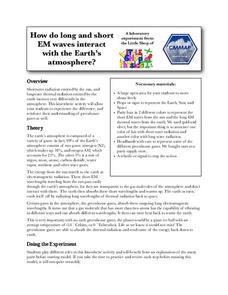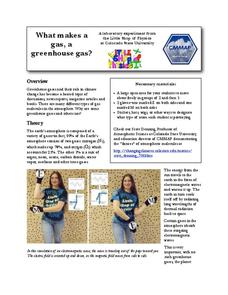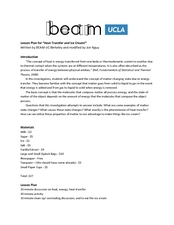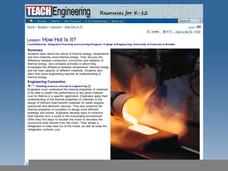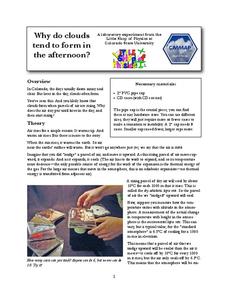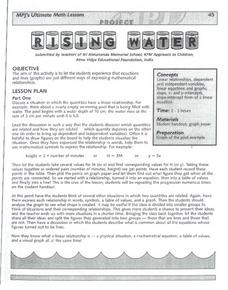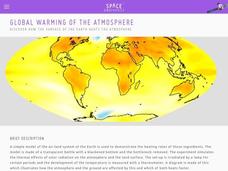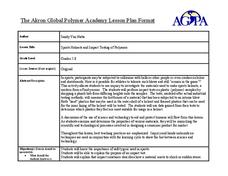Curated OER
Movement of Air
In this movement of air worksheet, students identify and describe the purpose for convection and how it effects Earth. Then they describe what thermals are and why they occur in hot and cold air movements. Students also explain why...
Curated OER
Science Word Search
For this science worksheet, students locate and identify various vocabulary terms related to earth science. There are 44 words/phrases located in the puzzle.
Curated OER
Thermodynamics
In this thermodynamics worksheet, students read about conduction, convection and radiation. They answer 47 questions about heat transfer, thermal equilibrium, insulators, conductors and the states of matter.
Curated OER
Specific Heat of Metal
Students experiment with different types of metal by dipping them in boiling water and cool water and recording temperature changes in the water. By doing this, they find the specific heat of the metals.
Colorado State University
How Do Long and Short EM Waves Interact with the Earth's Atmosphere?
Things are about to heat up in your classroom! A kinesthetic lesson asks learners to play the part of the gases in the earth's atmosphere and interact with the sun's radiation. The focus is to learn the impact of the increasing...
Curated OER
Using Heat
The 6 slides give a few examples of ways that we use heat and heating systems. There is a diagram of circulation in a stove and forced air system as well as other examples of heat movers. Great for an introduction.
Rice University
College Physics for AP® Courses
Take a look at an organized physics course. The 34-section electronic textbook covers material in AP® Physics 1 and 2. Teachers use the text to supplement lectures and have the class work through the labs. Each section contains multiple...
Curated OER
Properties of Matter
High schoolers describe four states of matter and their characteristics, explain thermal expansion of matter, interpret state changes in terms of kinetic theory of matter, explain relationship between temperature and volume of a gas,...
Colorado State University
What Makes a Gas, a Greenhouse Gas?—The Carbon Dioxide Dance
Investigate a heated topic in environmental science. Scholars team up to play the parts of gas molecules in the atmosphere. As the teacher moves about, acting as the electromagnetic wave, learners react as their molecules would to the...
Curated OER
Evaporation and Condensation
Students explore how temperature affects the processes of evaporation and condensation.
Curated OER
"Heat Transfer and Ice Cream!"
Students analyze earth science by creating a frozen treat in class. In this heat transfer lesson, students discuss how matter is transformed from solid to liquid and liquid to gas when energy is removed from the equation. Students...
Curated OER
Hess's Law
In this reactions worksheet, students use Hess's Law to calculate the heat gained or lost by different reactions. Students determine if the reaction would occur spontaneously at a given temperature. This worksheet has 9 problems to solve.
Teach Engineering
Capturing the Sun's Warmth
Passive solar heating is a technology that's been in use for thousands of years. Here, elementary schoolers are exposed to this type of heating, the materials that are used in passive solar heating, and they study how engineers design...
Teach Engineering
How Hot is Hot?
Elementary schoolers identify the three methods of heat transfer: conduction, convection, and radiation. The lesson is mostly lecture-based. When the teacher has finished the presentation, groups of pupils get into teams and they must...
Science Geek
Bulk Properties of Water
Learn the ins and outs of the properties of water through an engaging slide show. The lesson presents different facts about water including phase change, heat of fusion, heat of vaporization, and specific heat among others.
Colorado State University
Why Do Clouds Form in the Afternoon?
The stability of the atmosphere changes on a daily basis. A kinesthetic lesson models how the stability of the air changes as it's warmed by the sun. Learners connect their models to the changing air currents and movement of warm and...
Chicago Botanic Garden
Are Global CO2 Levels Changing?
According to the Mauna Loa observatory, carbon dioxide levels increased by 3 ppm in our atmosphere between 2015–2016. Individuals analyze carbon dioxide data from around the world and then share this with a home group in instructional...
Cornell University
Glued into Science—Classifying Polymers
Explore the unique characteristics of polymers. A complete instructional activity begins with a presentation introducing polymers. Following the presentation, young scientists develop a laboratory plan for creating substances using...
Curated OER
Conduction, Convection and Radiation
Sixth graders listen to descriptions of types of heat to gain background knowledge In this heat lesson, 6th graders perform experiments to understand various types of heat transfer (convection, conduction and radiation.) Students assess...
Curated OER
Rising Water!
Students observe water change from a liquid to a gas state when heated and then return to its liquid stage when cooled. They learn that gas molecules move faster than liquid molecules. They discover physical properties that describe how...
Space Awareness
Global Warming of the Atmosphere
Scientists know the amount of carbon dioxide in the atmosphere today is higher than at any point in the last 800,000 years. Scholars learn about the amount of thermic radiation absorbed by air and what happens to the rest of the...
Curated OER
Electrical Noise and Interference
In this electronics worksheet, students identify and differentiate the different types of noise. They complete 4 short answer questions about the topic.
Curated OER
Sports Helmets and Impact Testing of Polymers
Students examine the importance of good quality safety gear. In this investigative lesson plan, students will tests various polymers, collect data, and analyze the data to determine which polymer is best for safety helmets. They will...
Curated OER
Thermochemistry
In this thermochemistry worksheet, students answer 6 questions about specific heat, heat capacity and molar heat capacity. They also complete a crossword puzzle given 20 clues about topics related to thermochemistry. Students solve a...






